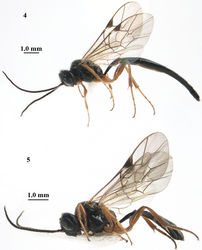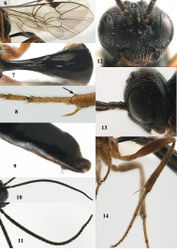Difference between revisions of "Seleucus cuneiformis"
m (Imported from Journal of Hymenoptera Research) |
m (1 revision) |
(No difference)
| |
Latest revision as of 16:24, 20 March 2013
| Notice: | This page is derived from the original publication listed below, whose author(s) should always be credited. Further contributors may edit and improve the content of this page and, consequently, need to be credited as well (see page history). Any assessment of factual correctness requires a careful review of the original article as well as of subsequent contributions.
If you are uncertain whether your planned contribution is correct or not, we suggest that you use the associated discussion page instead of editing the page directly. This page should be cited as follows (rationale):
Citation formats to copy and paste
BibTeX: @article{Achterberg2013JournalofHymenopteraResearch31, RIS/ Endnote: TY - JOUR Wikipedia/ Citizendium: <ref name="Achterberg2013Journal of Hymenoptera Research31">{{Citation See also the citation download page at the journal. |
Ordo: Hymenoptera
Familia: Ichneumonidae
Genus: Seleucus
Name
Seleucus cuneiformis Holmgren, 1860 – Wikispecies link – Pensoft Profile
Material
2 ♀ + 2 ♂ (RMNH) & 3 ♀ + 2 ♂ (AC), “Austria: Böhmerwald, Plöckenstein, 1200-1300 m, ex Blasticotoma filiceti on cf. Athyrium sp., coll[ected] 8.viii.2011, em[erged] 16 (1 ♂), 20 (1 ♀ + 1 ♂), 22 (1 ♂), 23 (2 ♀), 26 (1 ♀ + 1 ♂).vi.2012 & 1.vii.2012 (1 ♀), E. Altenhofer”.
Biology
Parasitoid of larvae of Blasticotoma filiceti Klug, 1834 (Tenthredinoidea: Blasticotomidae). The sex ratio is nearly balanced as far as the low numbers allow a conclusion. Only one male appeared before the females emerged; the others emerged together with the females.
Distribution
Palaearctic China (Henan), Czech Republic; Finland; Germany; Japan (Hokkaido); Korea; Poland; NW European Russia; Far East Russia; Sweden (Vikberg and Koponen 2000[1]; Yu et al. 2012[2]) and now Austria.
Notes
The apex of the fore tibia has a more or less angulate lamella (Fig. 8, not a tooth as is supposed to be present in Ctenopelmatinae); the ovipositor sheath points upwards compared to the hypopygium (Fig. 9); the ovipositor has a dorsal notch (Vikberg and Koponen, 2000; which excludes it from the Phrudinae and corroborates its inclusion in the Ctenopelmatinae); the first metasomal tergite has a long petiole and the spiracles are halfway along the notum (Fig. 7); the pterostigma is triangular with vein r emerging medially (Fig. 6); the frons is coarsely punctate (Fig. 12); the metasoma of the female is 3.0–3.5 times longer than the mesosoma (Fig. 4); below the clypeus is a distinct space because the clypeus is distinctly removed from the mandibles (Figs 12, 13); the clypeus has an apical fringe of bristles (Fig. 13); and the hind tarsus is very slender (Fig. 14).
Taxon Treatment
- Achterberg, C; Altenhofer, E; 2013: Notes on the biology of Seleucus cuneiformis Holmgren (Hymenoptera, Ichneumonidae, Ctenopelmatinae) Journal of Hymenoptera Research, 31: 97-107. doi
Other References
- ↑ Vikberg V, Koponen M (2000) On the taxonomy of Seleucus Holmgren and the European species of Phrudinae (Hymenoptera: Ichneumonidae). Entomologica Fennica 11: 195-228.
- ↑ Yu D, Achterberg C, Horstmann K (2012) Taxapad 2012, Ichneumonoidea 2011. Database on flash-drive. www.taxapad.com , Ottawa, Ontario, Canada.
Images
|

